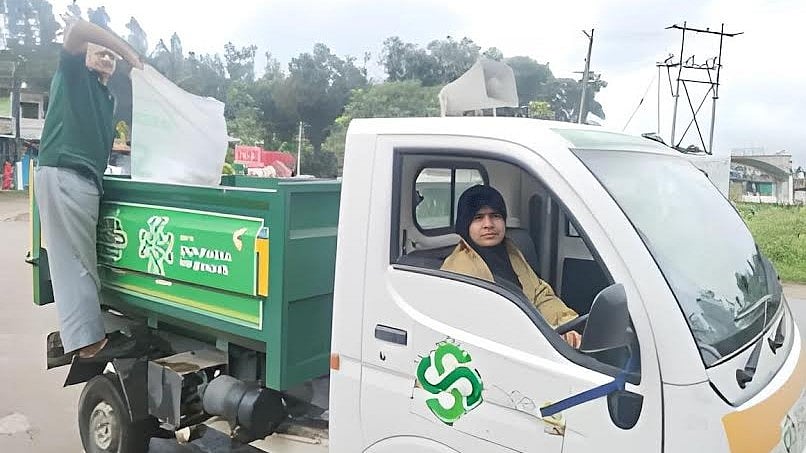
Through this work, Kuteja aims to create Open Defecation Free (ODF) communities and strengthen solid and liquid waste management systems in rural India.
Credit: Special Arrangement
Bengaluru: While the debate and efforts towards a more sustainable living is gaining ground, the journey of Kuteja Kubra from Sattihalli village in Chikkamagaluru shines a light on how rural women are leading the way in environmental stewardship—one household at a time.
A few years ago, Kuteja might not have imagined herself behind the wheel of a waste collection vehicle. But today, trained in solid and liquid waste management, waste segregation, and vehicle operations, she confidently drives the Swachh Vahini across Machagondana Halli, Handi, Gullanpet, and Indra Nagar, reaching more than 650 households. Her work ensures that rural waste is managed safely and efficiently—protecting both public health and the environment.
But Kuteja’s role goes far beyond collection. She is a community educator, going door-to-door to speak with families about proper waste disposal and segregation. Her efforts are rooted in the broader framework of national development goals, particularly the Swachh Bharat Mission (Grameen) and the Jal Jeevan Mission.
Through this work, Kuteja aims to create Open Defecation Free (ODF) communities and strengthen solid and liquid waste management systems in rural India. By maintaining cleaner surroundings and helping prevent contamination of local water sources, her efforts are directly aligned with JJM’s mission of ensuring safe and adequate drinking water to every rural household.
With the support of her husband, who runs a small hotel, and encouragement from the Sattihalli Gram Panchayat, Kuteja has carved out a new identity for herself—as a climate-conscious, sanitation-driven changemaker. Her journey has brought her financial independence, social recognition, and the satisfaction of serving her community in a meaningful way.
Her leadership is also redefining gender roles in rural Karnataka. In a space where waste management was often seen as menial or off-limits for women, Kuteja’s presence is shifting perceptions and encouraging other women to explore similar roles.
